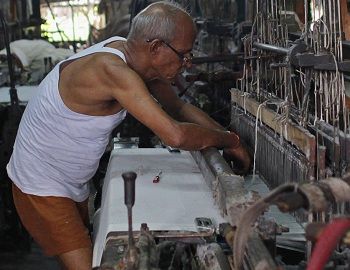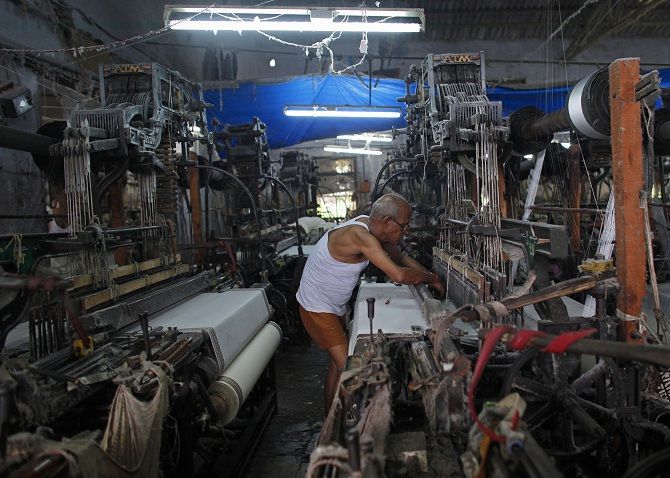 | « Back to article | Print this article |


Cottage industries across India have suffered heavily because of the note ban. In the second of a six-part series, Sanjay Jog travels to Bhiwandi to examine how the power loom industry here is coping five weeks on.
I: Cash crunch pain hits Dharavi's leather goods hub
Till November 8, power looms in Bhiwandi, a town 20 km north-east of Mumbai, worked in two shifts of 12 hours each. That changed in India's Manchester of the West after demonetisation came into effect.
Business has slowed because of fewer orders and the cash crunch is preventing owners and workers from completing the limited work they have.
"About 70 percent of the 1.2 million power looms in Bhiwandi have downed their shutters and the rest will close down soon," said Abdul Mannan Siddiqui, a power loom owner and president of the industry body Shantinagar Powerlooms Association.
While Bhiwandi's power loom industry, which weaves a third of the cloth that India wears, had been struggling on account of high electricity rates, dumping by China and administrative hurdles, demonetisation has dealt a crippling blow for many here.
Sajid Alam, a power loom worker, says, "I have been running from pillar to post, seeking a job following the closure of the unit I was working for. I was earning Rs 10,000 a month. I am not earning anything now."
Power loom owner Anwar Husain, who has been managing his business for over two decades in the Jabbar Compound region of Bhiwandi, says limited cash withdrawals have hampered operations.
"I have no choice but to close down my power loom for want of cash and inability to source raw materials," he says. "I am not able to pay the 15-odd workers I employ. Most of them have already left for their homes in Madhya Pradesh, Uttar Pradesh, Bihar and West Bengal. If the situation does not normalise soon, I will be compelled to sell my loom at scrap value."
Another power loom owner, Hayat Khan, says his unit produced 1,800 metres of cloth a day before demonetisation. "I am unable to withdraw enough money as banks do not have sufficient cash. Wages and electricity arrears are mounting. The situation is worse than in 1999-2000, when there was a slump in business," he says.
Bhiwandi, a 150-year-old town, is a key supplier of grey, a kind of rough-hewn cloth that is processed into fabric. According to local manufacturers, earlier about 600 trucks of yarn reached Bhiwandi daily to be spun into grey. Now there is none.
Purushottam Vanga, vice-chairman, Powerloom Development & Export Promotion Council, says almost 80 percent of the workforce in Bhiwandi are migrants. "Half of them have returned home."
While the government has taken cognizance of the situation, with Union Textiles Minister Smriti Irani visiting the town last week and promising relief measures, the emphasis is now on shifting to opening bank accounts for workers here.
The Bharatiya Janata Party MP from Bhiwandi, Kapil Patil, says, "Over 10,000 applications to open bank accounts have been filed."
While this is only 2 percent of the workforce in Bhiwandi, experts say a start has been made to sensitise people to use banking channels.
But executives of industry bodies such as Vanga, who is also president of the Bhiwandi Padmanagar Powerloom Weavers Association, are hopeful. "If the decreasing sales of readymade cloth in the market following demonetisation can be addressed, we can tide over other teething problems."
III: How demonetisation stole Sivakasi's sparkle
IV: The cost of demonetisation: Jobless hundreds in Jalandhar
V: In Assam's tea gardens cash is perennially in demand
VI: Demonetisation has driven Solapur's beedi workers to loan sharks